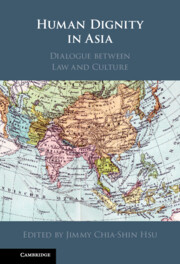Book contents
- Human Dignity in Asia
- Human Dignity in Asia
- Copyright page
- Dedication
- Contents
- Editor and Contributors
- Preface
- Abbreviations
- Introduction Human Dignity, Human Rights, and Cultural Change in Asia
- 1 Human Dignity in Indian Constitutional Adjudication
- 2 The Development of Individual Dignity in Japan
- 3 Constitutional Discourse on Human Dignity in South Korea
- 4 Human Dignity in the Jurisprudence of the Taiwan Constitutional Court
- 5 The Human Dignity Factor
- 6 Human Dignity in the Jurisprudence of the Indonesian Constitutional Court
- 7 Dignity as a Constitutional Value in Hong Kong
- 8 Human Dignity and Relational Constitutionalism in Singapore
- 9 Personal Dignity under Chinese
- 10 Virtue, Dignity, and Constitutional Democracy
- 11 Buddhist Philosophical Approaches to Human Dignity
- 12 Dignity and Status in Ancient and Medieval India
- 13 Human Dignity, Pancasila, and Islam
- 14 Catholicism and Human Dignity in the Philippines
- 15 Protestantism and Human Dignity in South Korea
- Index
8 - Human Dignity and Relational Constitutionalism in Singapore
Published online by Cambridge University Press: 26 July 2022
- Human Dignity in Asia
- Human Dignity in Asia
- Copyright page
- Dedication
- Contents
- Editor and Contributors
- Preface
- Abbreviations
- Introduction Human Dignity, Human Rights, and Cultural Change in Asia
- 1 Human Dignity in Indian Constitutional Adjudication
- 2 The Development of Individual Dignity in Japan
- 3 Constitutional Discourse on Human Dignity in South Korea
- 4 Human Dignity in the Jurisprudence of the Taiwan Constitutional Court
- 5 The Human Dignity Factor
- 6 Human Dignity in the Jurisprudence of the Indonesian Constitutional Court
- 7 Dignity as a Constitutional Value in Hong Kong
- 8 Human Dignity and Relational Constitutionalism in Singapore
- 9 Personal Dignity under Chinese
- 10 Virtue, Dignity, and Constitutional Democracy
- 11 Buddhist Philosophical Approaches to Human Dignity
- 12 Dignity and Status in Ancient and Medieval India
- 13 Human Dignity, Pancasila, and Islam
- 14 Catholicism and Human Dignity in the Philippines
- 15 Protestantism and Human Dignity in South Korea
- Index
Summary
Human dignity is a contested concept. While “dignity as autonomy” reflects universalist liberal egalitarianism, “dignity as status”refers to an aspect of social relationship within a hierarchically ordered society. While all citizens have inherent dignity, individuals occupying certain offices or attaining certain accomplishments may enjoy special dignity, in the form of privileges and immunities. This is evident in Singapore, where the government promotes relational constitutionalism, which seeks to secure rights while sustaining durable relationships and solidarity within an ethnically and religiously diverse polity. While dignity is not an explicit constitutional value, this chapter explores how it is apprehended as a public value. The government has endorsed the Universal Declaration of Human Rights, which affirms human dignity as foundational. It considers how human dignity has been invoked before and beyond the courts, examining how the concept and cognates like honor, integrity, benevolence and virtue shape each other. Particular attention is paid to how human dignity is shaped as manifest in laws regulating political defamation and the treatment of migrant workers.
Keywords
- Type
- Chapter
- Information
- Human Dignity in AsiaDialogue between Law and Culture, pp. 187 - 219Publisher: Cambridge University PressPrint publication year: 2022



